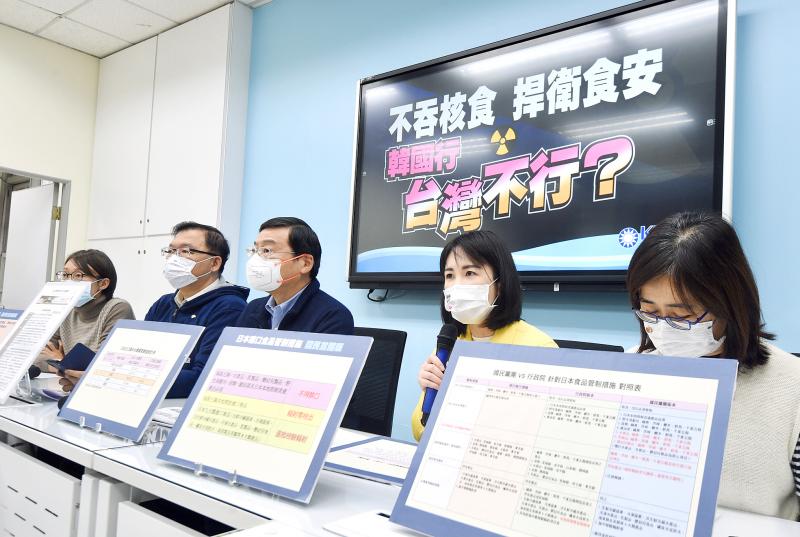The Chinese Nationalist Party (KMT) caucus yesterday called on the government to be more restrictive regarding the types of food that can be imported from Japan’s Fukushima and surrounding prefectures once an import ban is lifted.
The Executive Yuan on Tuesday last week said that Taiwan would soon allow the importation of food products that had been banned following the 2011 Fukushima Dai-ichi nuclear power plant disaster.
Foods imported from the five prefectures would need certificates of origin and radiation inspection certificates, while imports of mushrooms, meat from wild animals and hill potherbs from the prefectures would still be banned, it said.

Photo: Peter Lo, Taipei Times
The caucus yesterday said that it hoped the Democratic Progressive Party (DPP) government would continue to ban imports of seafood, dairy and baby food from the five prefectures, citing similar restrictions in South Korea.
Taiwan is the third-largest importer of Japanese food, which gives it the right to be stricter, KMT caucus whip William Tseng (曾銘宗) told a news conference at the Legislative Yuan in Taipei.
“Taiwanese are not convinced by the Executive Yuan’s ‘three measures and principles’ on lifting the import ban,” KMT Legislator Hsieh Yi-fong said. “There should also be a requirement that imported food products have zero radiation.”
The KMT had made several proposals to the administration, including sending experts to Japan to inspect local radiation levels, requiring batch-by-batch food inspections in nine categories, testing foods for the presence of cesium-137 and strontium-90, and subsidizing the purchase of radiation testing equipment for all local governments, KMT Legislator Wu I-ding (吳怡玎) said.
“Although the amount of food that enters Taiwanese campuses from those prefectures is relatively low, the potential for it entering school meals should not be ignored,” KMT Legislator Lin Yi-hua (林奕華) said, adding that the School Health Act (學校衛生法) should be amended to restrict the use of imported foods from the five prefectures in school meals.
The KMT had been introducing local ordinances on the issue, but was told by the administration not to create conflicts with the national legislation, KMT Legislator Lee De-wei (李德維) said.
However, Constitutional Interpretation No. 738 stipulates that the spirit of local self-governance must be protected in accordance with local conditions and in the public interest, he said.
Tseng criticized calls by DPP caucus whip Ker Chien-ming (柯建銘) for the KMT to unite with the DPP over the food imports, to assist in Taiwan joining the Comprehensive and Progressive Agreement for Trans-Pacific Partnership (CPTPP).
“Should the public’s rights be sacrificed for the purpose of joining the CPTPP?” he asked.
Accepting food imports from the five prefectures should not be a requirement for joining the trade pact, he said, citing Singapore’s two-year delay between joining the CPTPP and accepting certain import items.

An undersea cable to Penghu County has been severed, the Ministry of Digital Affairs said today, with a Chinese-funded ship suspected of being responsible. It comes just a month after a Chinese ship was suspected of severing an undersea cable north of Keelung Harbor. The National Communications and Cyber Security Center received a report at 3:03am today from Chunghwa Telecom that the No. 3 cable from Taiwan to Penghu was severed 14.7km off the coast of Tainan, the Ministry of Digital Affairs said. The Coast Guard Administration (CGA) upon receiving a report from Chunghwa Telecom began to monitor the Togolese-flagged Hong Tai (宏泰)

A cat named Mikan (蜜柑) has brought in revenue of more than NT$10 million (US$305,390) for the Kaohsiung MRT last year. Mikan, born on April 4, 2020, was a stray cat before being adopted by personnel of Kaohsiung MRT’s Ciaotou Sugar Refinery Station. Mikan was named after a Japanese term for mandarin orange due to his color and because he looks like an orange when curled up. He was named “station master” of Ciaotou Sugar Refinery Station in September 2020, and has since become famous. With Kaohsiung MRT’s branding, along with the release of a set of cultural and creative products, station master Mikan

RISING TOURISM: A survey showed that tourist visits increased by 35 percent last year, while newly created attractions contributed almost half of the growth Changhua County’s Lukang Old Street (鹿港老街) and its surrounding historical area clinched first place among Taiwan’s most successful tourist attractions last year, while no location in eastern Taiwan achieved a spot in the top 20 list, the Tourism Administration said. The listing was created by the Tourism Administration’s Forward-looking Tourism Policy Research office. Last year, the Lukang Old Street and its surrounding area had 17.3 million visitors, more than the 16 million visitors for the Wenhua Road Night Market (文化路夜市) in Chiayi City and 14.5 million visitors at Tainan’s Anping (安平) historical area, it said. The Taipei 101 skyscraper and its environs —

Taiwan on Friday said a New Zealand hamburger restaurant has apologized for a racist remark to a Taiwanese customer after reports that it had first apologized to China sparked outrage in Taiwan. An image posted on Threads by a Taiwanese who ate at Fergburger in Queenstown showed that their receipt dated Sunday last week included the words “Ching Chang,” a racial slur. The Chinese Consulate-General in Christchurch in a statement on Thursday said it had received and accepted an apology from the restaurant over the incident. The comment triggered an online furor among Taiwanese who saw it as an insult to the